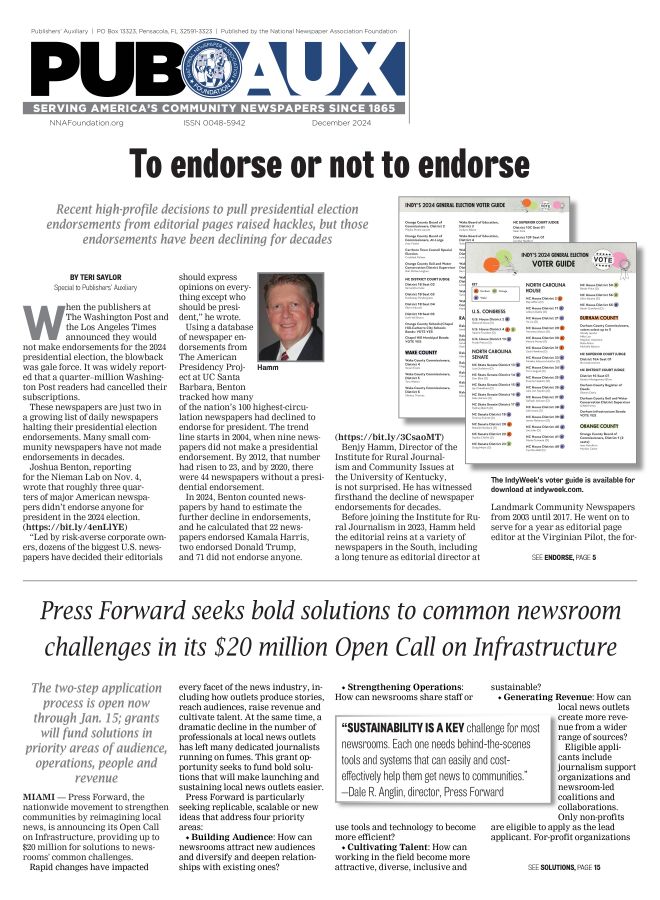Newspapers, NC state Senate battle over public notice
May 3, 2013
By Teri Saylor
Special to Publishers’ Auxiliary
RALEIGH, NC—As if a state Senate committee hearing in Raleigh, NC, was not already tense, it grew downright contentious after legislators narrowly voted to approve a bill that would allow local governments in a dozen counties to place legal notices on their own, government-controlled websites instead of in newspapers.
Newspaper representatives present at the hearing said they had lined up enough votes from the 11 Senate State and Local Government Committee members to defeat the proposed legislation 6 - 5, but the voice vote was too close to call. The committee hearing was adjourned before anyone could call for a show of hands or a roll call vote.
Publishers on hand to testify against SB 287 on April 16 reported Senate Committee Chair Tommy Tucker, a Union County Republican, admonished North Carolina Press Association President Hal Tanner III, when he protested against the chairman’s failure to issue a roll call vote.
“I approached the chairman and tried to explain that open government is something we (the NCPA) are trying to push forward,” said Tanner who is a third-generation publisher of The (Goldsboro) News-Argus. “I explained that I am a Republican and I publish a conservative newspaper. I told him that during the elections, the Republicans advocated transparency and asked how does this committee synch up with that platform?”
According to published news reports, Tucker had complained about “a scathing editorial” in his hometown newspaper, The Monroe (NC) Enquirer-Journal.
The editorial called the senator out for “slamming doors on public access to government and government records,” based on his support of legislation that would require the public to pay for the time it takes local government officials to produce requested public records.
Tanner responded that newspapers provided non-partisan coverage and described a handful of Democratic politicians that newspapers had reported on for misdeeds and transgressions.
Then, according to Tanner and other witnesses, Tucker replied: “I am the senator; you are the citizen. You have to be quiet.”
The outburst surprised other newspaper publishers within earshot.
“It was crazy,” said Les High, news editor at the News Reporter in Whiteville, NC, and the NCPA president-elect.
High turned to his newspaper to reflect on the hearing and report its outcome to his readers.
“It was one of those ‘Did that really just happen?’ moments—a surprise to anyone who values the principles of democracy and decency,” High wrote in a personal column. “Had I had the presence of mind to video this exchange with my phone, Tucker would have gone viral on YouTube.”
In fact, the incident did go viral on Facebook and in national media after The Charlotte (NC) Observer reported on it.
Stories showed up in several blogs including the Huffington Post, Rachel Maddow on MSNBC, and even Hollywood Gossip. Local websites and left-leaning organizations picked it up, too.
Five days after the committee hearing, a scathing post on Progress North Carolina’s Facebook page had recorded 15,548 “shares” and 2,111 comments.
Progress North Carolina also raised money to publish a full-page ad in The Enquirer-Journal.
“I am sure we will receive pushback from folks in Tucker’s camp for publishing the ad, but the message—that he should be listening to the public and should be held accountable is an important message,” Enquirer-Journal Publisher Marvin Enderle wrote in an e-mail. “Not only do his actions appear to show that he doesn’t understand this, but the legislation he is pushing and supporting indicates this as well.”
The NCPA is seeking support for a compromise bill in the state House of Representatives similar to legislation passed in Florida and Tennessee to cap charges for placing public notice ads in newspapers. The bill also would require newspapers to place notices online at no additional charge. As of April 21, that bill had not come up in a House committee. But publishers remain hopeful.
“The compromise bill supported by the NCPA, H723, is a good piece of legislation,” Enderle wrote. “We at the Enquirer-Journal know from personal experience that many of our readers do not have and do not want Internet access. I am sure that number will decrease in time. But it represents a group of citizens from which local government would remove access to public notices if those notices were not published in the print edition of newspapers.”
High, who testified on behalf of NCPA before the Senate State and Local Government Committee, expressed the same concerns, adding that his own father, Jim High, publisher of The News Reporter has the same attitude about the Internet as many of the newspaper’s readers.
He doesn’t use it.
“My father, who just turned 80, still comes to the paper every day, where he types out news briefs on an Underwood typewriter that’s probably older than I am,” High told the committee. “He does not own a computer, nor will he ever. Like tens of thousands of North Carolinians, he will never see a public notice if it’s printed on a government website.”
High went on to tell senators that public notices should reside in newspapers and not on government websites “because newspapers are still by far the primary source where people get their local news, especially in rural counties where Internet usage is low.”
High testified that a local senator had contacted a small-town manager in Columbus County to inquire about the status of public notice laws on that town’s website. An obscure local bill passed several years ago allows the town to publish its notices online. But the town continues to place notices in newspapers anyway.
“We put (the notices) in the paper like we’ve always done,” the town manager replied. “Here in Columbus County and in rural areas across the state, we still have a lot of people scared to death of computers and who still read newspapers.”
North Carolina newspapers maintain the value that local governments receive from public notices placed on their pages far outweighs the cost.
Enderle said legal advertising The Enquirer-Journal placed for the Union County Board of Commissioners in 2012 totaled $2,121.61.
“Legal advertising from other Union County government departments, other than Union County Public Schools, in 2012 was $4,314.80, more than half of which was for the Union County Board of Elections for publication of notices regarding the most fundamental rights in our democracy—the right to vote,” Enderle wrote.
In Goldsboro, keeping public notices in newspapers receives mixed support among local government officials according to Tanner.
But readers are solidly in favor of keeping notices in the News-Argus.
“Readers would hate to see legals leave the newspaper,” Tanner said. “We are rural. We don’t have great bandwidth. A lot of residents don’t have access to the Internet and don’t like it.”
As of press time, neither S287 nor H723 had advanced.







